I thought I would start by again drawing your attention to the Medway History Showcase on Saturday 21 October. To book your free tickets go to: Royal Engineers Museum Tickets, Products, Membership Plans – Buy Online (digitickets.co.uk) or via the Royal Engineers, Gillingham website and Medway History Showcase – Royal Engineers Museum (re-museum.co.uk) and see the ‘BOOK TICKETS’ tab on the right-hand side. It will be excellent to see you there for a great day showcasing the history of north (and other parts of) Kent.
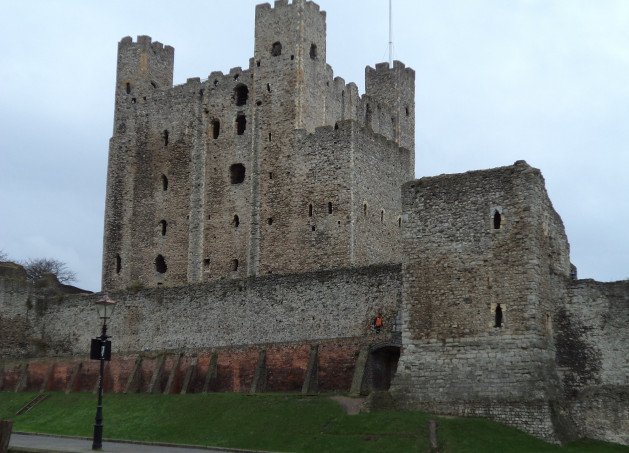
Secondly, just to say the FCAT and CKHH talk last week by Dr Lindsey Büster (Archaeology at CCCU)on ‘Commios: Iron Age Britons and their continental neighbours’ was fascinating and an excellent demonstration of the potential of the new scientific techniques surrounding genetical mapping of ancient bones. This has great potential to offer clues about the movement of peoples, as well as how communities appear to have operated, at least in terms of the placement of burials. It will be interesting to see how this all develops, including the use of evidence from Kent.
Yesterday (Wednesday) Drs Diane Heath and Pip Gregory were over at the Franciscan Gardens marking out their next Green Dragon following the success of the first two on the CCCU campus. While they were doing that for the afternoon, it was great to have the first Kent History Postgraduate group presentation for 2023/24. Jason Mazzocchi is just starting his second year as a part-time doctoral student, and he provided a thoughtful talk on how he had used the first year to explore the historical context for his interdisciplinary project on social and cultural practices in the Cinque Ports under the early Stuart monarchs through an analysis of discourse and transgression relating to oral, written and pictorial sources. As he said, this has been a fascinating journey and he has been exploring how the symbolism of such matters as heraldry, custumals and judicial practices adopted by the various Cinque Ports, and especially Faversham for the later medieval and even more early modern period offers a way in to think about social identity. In particular, he is interested in bureaucratisation is part of the civilising process, and how such issues alongside structures and processes involving power and knowledge were part of the lived experiences of those in early 17th-century Faversham.
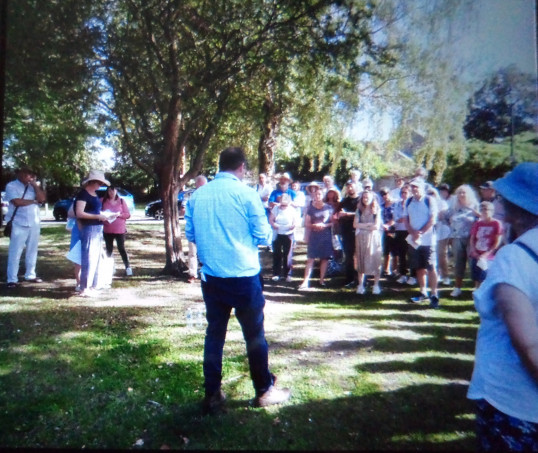
Having explained how he intends to approach his project Jason discussed the case study he has been working on and how he intends to take forward his research over the next year. For the Faversham oyster disputes of the late 16th and early 17th-centuries look to be extremely fruitful, not only in terms of the considerable amount of documentary evidence that they produced, but also in relation to the three detailed maps of the oyster grounds. Moreover, other disputes over oysters were similarly involving the men of Milton and Whitstable, thereby offering Jason contrasting approaches – from documentation format to court procedures. Consequently, this looks to be an exciting project and it will be excellent to see how it develops over the coming year. Additionally, hopefully the group will be able to welcome new members who have just started their doctoral studies at CCCU.
As I now have almost all the details in from the speakers at the Medieval Canterbury Weekend 2024, which will be from Friday 26 April to Sunday 28 April, I thought I would use the final section here to mention just one of the themes that will be available for people to follow during the Weekend. Having an undergraduate dissertation student who is exploring the portrayal of medieval women in a range of modern films, it is well-worth highlighting that a great deal of excellent archival research has taken place over the last forty or so years which has looked in detail at the lives of a wide range of medieval women, from royalty to the peasantry and their urban neighbours. Not that you would know that from the ‘big screen’ or even much on the ‘small screen’ yet often what we have now learnt from textual and other sources is fascinating, as I’m sure our audiences will agree next April.
For to begin the Medieval Canterbury Weekend on the Friday, Professor Louise Wilkinson will explore the roles open to women in the medieval English forest. As her title indicates: Move over Maid Marian! Women in the Medieval English Forest the royal forest in thirteenth-century England was, in fact, home to a great many women from all social backgrounds, at least some of whom experienced just as eventful lives as the later literary heroine – Maid Marian is an early modern addition. Aristocratic, peasant and religious women all helped in their different ways to administer, manage and shape the landscape of the royal forest. As Louise says, women frequently figure in forest records as vigorous participants in forest life. Some acted as forest officials, while others fell foul of forest law, committing offences such as poaching venison and hunting without royal permission. Consequently, this promises to be a brilliant exploration and a great start to the Weekend.
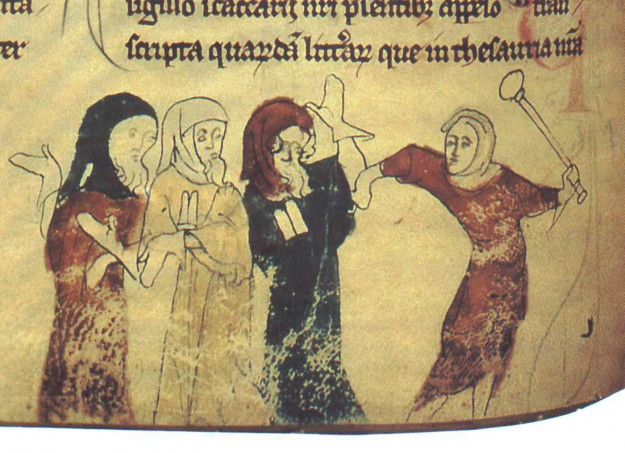
Now I’m sure medieval women will be in Dr Dean Irwin’s talk on Jews and Christian living as neighbours in medieval Kent on Saturday morning, as well as finding women among Professor Chris Briggs’ late medieval rebels on early Saturday afternoon, but as the subject of her talk the next ‘medieval women’ lecture will be later that afternoon when Dr Janina Ramirez will dig beneath the surface of what is often seen as a society where women were oppressed and excluded to delve into the truth of our past. As a result, she will reveal that the ‘dark’ ages were actually anything but. For in her lecture, she will re-examine some extraordinary women like Hildegard of Bingen, cast a new light on over-written females like Aethelflaed and King Jadwiga, and use recent discoveries to find lost individuals like the Loftus Princess and the Birka Warrior Woman, as she uncovers the incredible impacts these women had on society.
Then for the final session on the Saturday we can offer you a choice of royal women in the form of the three wives of Baldwin I or the working lives of women in medieval England after the Black Death. For those opting for the wives of Balwin, Dr Susan Edgington will attempt to restore to them their own biographies, even though they were given very little attention in contemporary chronicles. For Baldwin of Boulogne was successively a First Crusader, the first Latin Count of Edessa, and king of Jerusalem (1100–1118), and he married three times: as crusader, as count, and then as king.
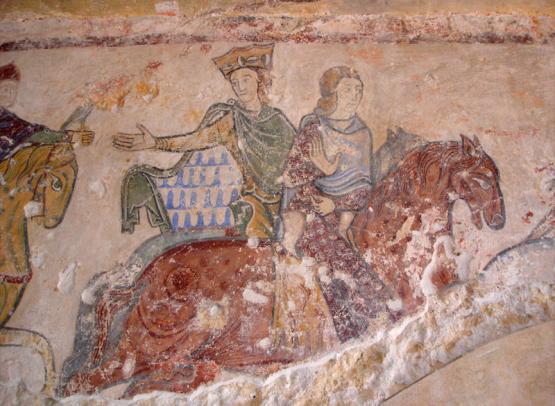
Those opting to find out more about the lives of women much further down the social scale, there is the chance to hear Professor Mark Bailey’s talk. He will review the evidence and the arguments for one of the liveliest current debates in social history. For was the post-Black Death period really a golden age for women as has been claimed by some historians in terms of their being able to enter the labour market? As he will show, others have argued that the golden age was restricted to women in the North Sea region of Europe, creating the nuclear ‘western’ family and driving the march to modernity.
Sunday will see a return to medieval women within a range of topics, thus for instance Professor Chris Woolgar will explore English people and their goods in late medieval society. This talk will offer fresh perspectives on mentalities and daily lives amidst the growing material world of the objects themselves and their connections to medieval people, from textiles, clothing and furnishings, to cherished drinking vessels.
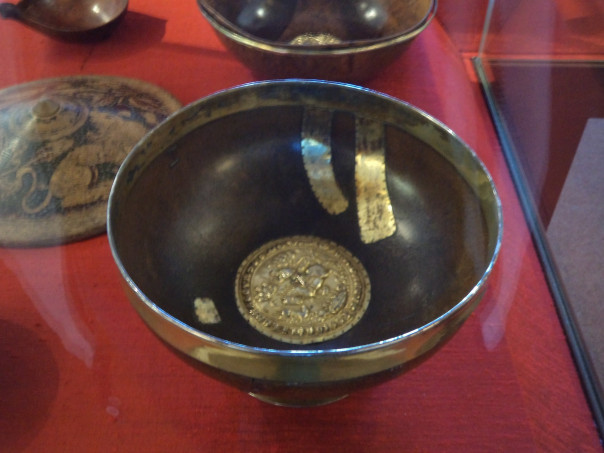
As an alternative Dr Alexandra Lee will take as her starting point that in the summer and autumn of 1399, when plague swept through the northern and central Italian peninsula, people were persuaded to don white clothing and participate in religious processions to help ward off the disease. She will consider why a religious response to disease made sense in medieval Italy, and address some of the actions that people took, including singing devotional hymns and self-flagellation.
Other choices on Sunday will see Dr David Rundle discussing what the Italian Renaissance owed to England, the late medieval rise of the Boleyn family by Dr Claire Martin, Alfred Hawkins’ talk on the Tower of London as a royal palace in medieval times where he is Assistant Curator and Professor Caroline Barron’s exploration of a fascinating late medieval London illustrated document that features some very splendid headgear! Hopefully this has whetted your appetite for next April and we’ll look forward to welcoming you to Old Sessions House on the CCCU Canterbury campus.
 Centre for Kent History and Heritage
Centre for Kent History and Heritage Sheila Sweetinburgh
Sheila Sweetinburgh 2364
2364


Absolutely fascinating
Delighted to hear that you enjoyed it.